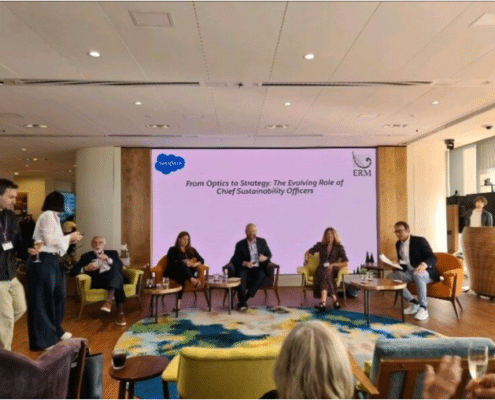Tag Archive for: leadership

Leadership lessons from Zelenskyy and Putin
Blog, Corporate Culture, Leadership, Podcast
As Russia continues to attack Ukraine, the whole world is watching a momentous clash of leadership styles. No one is more qualified to analyze the situation than political scientist and former US ambassador to Russia Michael McFaul. In…

Leaders, Don’t Fear AI…Embrace It
Blog, Corporate Culture, Leadership
Combining the best of human ingenuity and generative AI
The rise of machine learning and AI has been ongoing for quite a while, but it’s only relatively recently that conversations surrounding generative AI have really taken…

How the Sustainability Function in Corporations is Transforming
Blog, Compliance & Ethics Programs, Corporate Culture, Events, VideoIn July 2023, our Executive Director Alison Taylor participated on a panel in London, hosted by Salesforce, on how the sustainability function in corporations is transforming.

Leaders, Know What You Value If You Want To Have Impact
Blog, LeadershipIt is said that a leader’s effectiveness comes down to their behavior. But what leaders value can be as important. After all, behavior is often a means to an end.

The Difference Ethical Leadership Can Make in a Pandemic
BlogThe human costs of the COVID-19 pandemic are hard to grasp and accept.

How Leaders Help People Find Real Hope in the Face of a Pandemic
Blog
From all corners of the earth, this pandemic has revealed humanity at our best, combating a pandemic virus with a pandemic of compassion.
Like many leaders, my clients are scrambling to adapt to this new “virtual reality” of uncertainty…

The Case for Diversifying the Prototypical Leader
BlogFostering a diversity of views and styles of leadership could give organizations, among other things, an ethical advantage.

Leaked Boeing Emails Show Slippery Slope of a Bad Compliance Culture
BlogToday’s hyper-transparent environment has given the public stunning opportunities to review internal communications from executives at leading companies and to pass real-time judgments on the strengths and vulnerabilities of their cultures.…

The Psychology of Ford’s Fiesta and Focus Cover-Up
BlogIt started with a trail of car owners bringing their Fords to repair shops. Eventually, it escalated to an out-of-control hemorrhaging of warranty costs and legal bills. Now Ford faces a federal criminal fraud probe into its conduct. Did the…

Here Is What Replaces Shareholder Primacy
BlogOne day, about a decade ago, an evolutionary biologist from Binghamton, New York, made a decision: He’d use his knowledge of humanity’s social nature to try to understand and improve its social life, especially in his hometown.
